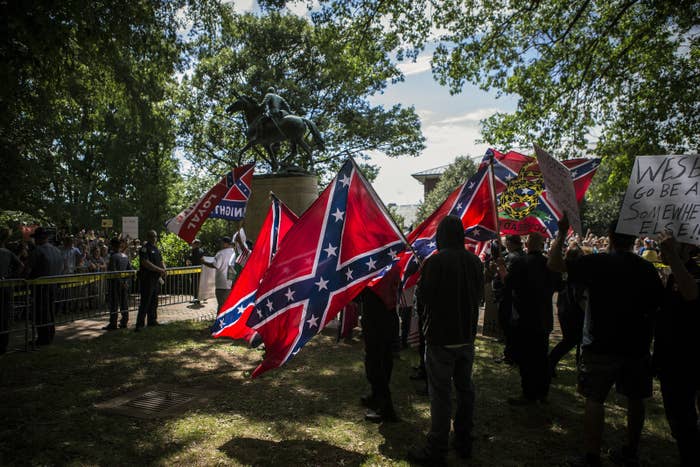
In a new poll, registered voters of color in Virginia say removing Confederate statues and memorials from public spaces is only “somewhat important” compared to other issues.
Conversely, those voters ranked access to quality education, safety for people of color, and standing against the rise of white nationalism as matters of “extreme importance.”
The poll, conducted by two Democratic-leaning groups, BlackPAC and brilliant corners strategies, comes amid a broad and fraught debate about how to handle and when to remove Confederate memorials — especially in Virginia, where a man who attended a white supremacist rally rammed a car into a crowd of counterprotesters, ultimately killing a woman. The debate has also entered into the state’s upcoming governor’s race.
The groups surveyed about 1,000 voters of color registered in Virginia, including 600 black voters, and 200 Latino voters, and 200 Asian American-Pacific Islander voters, respectively. Voters were asked to rate a set of issues based on race and identity — with 10 being “extremely important,” 5 being “somewhat important” and a 0 being “not important at all.”
Forty-three percent of black voters (the highest percentage) put the removal of Confederate monument at or near the top of their personal priorities; 31% of Hispanic and 35% Asian-American Pacific Islander voters ranked removing Confederate monuments that high. All told, the removal of Confederate statues and monuments had an average score of 5.8-level importance among groups participating in the survey.
Confederate symbols have become a flashpoint in national politics: On the left, symbols like the Confederate flag are held up as relics of white supremacy that represent a legacy of violence against black people over whose freedom the Civil War was fought. Their supporters, meanwhile, largely describe the symbols as an ode to heritage. That debate has been shadowed by violence: both in Charlottesville and in places like Charleston, South Carolina, Dylan Roof killed several members of a black church. He had been photographed with the Confederate flag, which the state subsequently removed from the statehouse grounds after the shooting.
Trump’s response to the Charlottesville violence, in which he described “very fine” people among white supremacists who had rallied around a statue of Robert E. Lee, was widely criticized, especially by black Americans.
But according to the poll, voters of color say they are less likely to respond to specifically anti-Trump messages, and far more likely to be motivated to cast a vote that sends a strong message about their feelings on racism. People who say they are concerned about the protection of voting rights are most likely to vote, according to the poll.
Cornell Belcher, the Democratic pollster who conducted the poll, told BuzzFeed News he wasn’t surprised that the issue of the Confederate monuments was such a low priority.
“When you think about communities of color feeling literally threatened and unsafe in this current environment, issues like the statues are important, but clearly they’re not going to rise to the issue of some of the other issues around racial profiling and community safety where it is a life and death situation in these communities,” he said.
Adrianne Shropshire, BlackPAC’s executive director, said she found the response to the issue of the removal of Confederate monuments and statues “a little bit surprising” but that it was important to look at voter attitudes through the lens of responses to questions about ending white supremacy and fight racism and discrimination. “Ultimately, the visuals of Nazis marching in the street in Charlottesville took precedence over the monument issue. [The responses] didn’t center necessarily on the monuments but instead on the potential for racialized violence,” said Shropshire.
Belcher said that Latino voters in particular are “much more interested” in elections than in years past, but that you “don’t see the same some voter intensity” with black Americans, particularly younger voters. Belcher said that the way to engage is to hammer a compelling message on fighting against discrimination, alluding tangentially to a fear that black voter turnout — black women, for instance, trail both Latino and AAPI women in vote likelihood, according to the survey — could be returning to pre-Obama era levels.
“That’s really problematic for Democrats and progressives if there's a pre-Obama reversion,” he said.
Virginia’s elections take place Nov. 7. Ralph Northam, the Democratic candidate for governor, is trailing Terry McAuliffe's 2013 performance with voters of color. Justin Fairfax, the Democratic candidate for lieutenant governor who is black, leads in popularity over Republican Jill Vogel with voters of color. A July Virginia Commonwealth University poll had Fairfax with a six point lead over Vogel, but the pollsters recommended Fairfax and Democrats take action increase his name ID.
